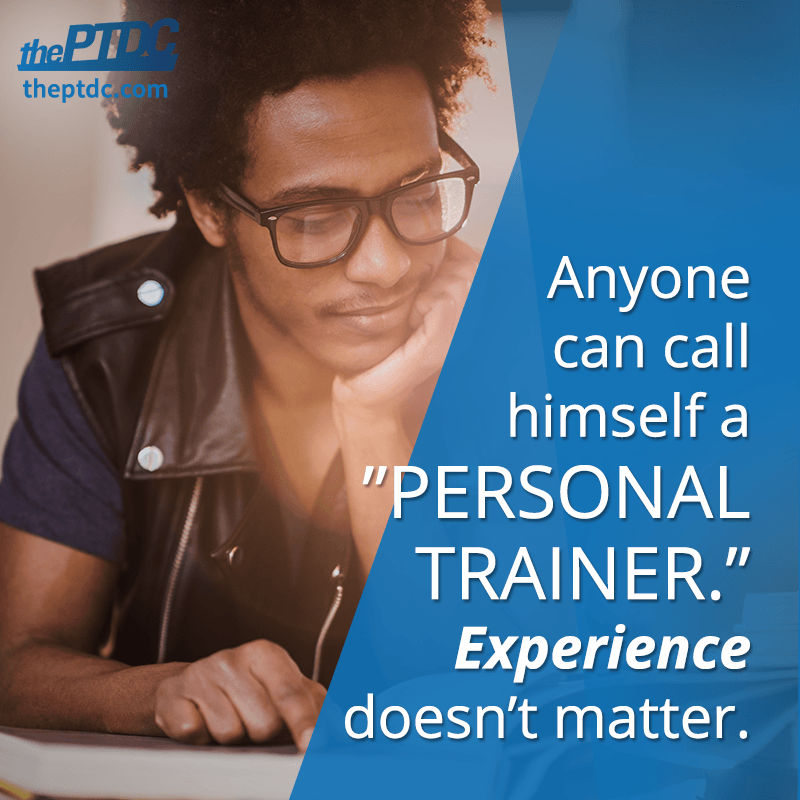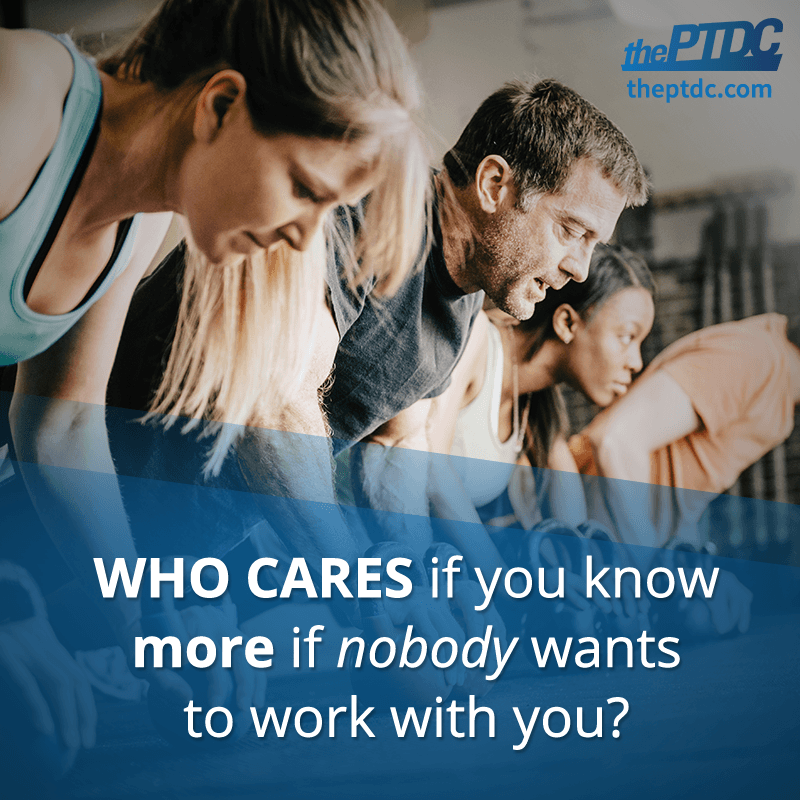College isn’t for everyone. I see that every day at my job, where I train young college grads to be personal trainers.
Some of them just want to train people, and could easily have done so without spending four years on campus and loading themselves down with tens of thousands of dollars of debt.
For those people, college is more of an anchor than a ladder.
But at the same time, I absolutely love my job. I’m an exercise physiologist in a hospital-run fitness setting, and I couldn’t have it without a degree in exercise science.
So how do you decide if college is the right choice for you? What are the benefits of a formal education for a personal trainer, compared to the cost? What are the risks of not spending that time in a classroom, compared to the benefits of going straight to work and gaining experience while earning money instead of borrowing it?
Let’s start with the easiest question, and then get into the tougher ones.
Who Needs a College Degree?
If you’re interested in physical therapy, occupational therapy, or exercise physiology, your decision’s already been made. Nobody wants to see a self-taught physical therapist after knee replacement. You need a degree.
Likewise, if you want to train high-level athletes in a college or pro setting, you may need to be a certified strength and conditioning specialist (CSCS), which requires a college degree. (It doesn’t matter what the degree is in; you can be an English major, as long as you can pass the test.)
The requirements for certification as an athletic trainer (ATC) are even higher.
Some gyms require both a CSCS and a degree in exercise science, but most don’t. For example, when my editor asked Eric Cressey, cofounder of Cressey Sports Performance, if he requires his coaches and interns to have a degree, he replied with an emphatic “Nope! I can teach them competency for our business better than any college curriculum can.”
So if you can get in the door at a place like CSP, where they train a long list of pro and amateur baseball players (including both of 2017’s Cy Young Award winners, Corey Kluber and Max Scherzer), how important can college be?
The Benefits of a College Education
School forces you to discipline yourself. How many of us would voluntarily subject ourselves to the kind of study it takes to write a paper on the biomechanics of bench pressing? If you want passing grades, you have to do that, and much more.
College also offers you perspectives you might not find on your own. You’ll have professors from all walks of life, with different opinions on nutrition, biomechanics, programming, and just about anything else that’s open to interpretation.
You may not agree with them, and you may want to forget everything they taught you the moment you pass their exams. But that doesn’t mean there’s no value in their perspective. Just hearing their side of the story, and learning how they arrived at it, will help you develop a cohesive training philosophy of your own.
Can you find a variety of opinions outside the classroom? Undoubtedly. Talk to 20 different trainers and you may get 20 different but equally passionate lectures on why their approach to the squat is the best approach. You may get that many in a single CrossFit box.
Where school is different is that these diverse views come from people who’ve spent decades of their lives practicing, studying, and writing rigorous research papers on these topics. They aren’t random people in the gym or on Facebook.
The Downside of College
You have to start with the cost.
College has gotten incredibly expensive in the U.S., for multiple reasons. Colleges now offer more amenities to entice students; states subsidize a lower percentage of each student’s tuition; federal grants are less generous; and college administrative costs have skyrocketed.
Combine rising costs with lower wages for the kind of work students typically get, and the upshot is that many of us graduate with crippling debt—a problem driven, in part, by how lucrative those loans are for the lenders.

By contrast, if you start training clients straight out of high school, and pay for your certs and continuing education as you go, you can have four years’ worth of experience, and no outstanding loans, by the time your peers graduate from college with zero experience and piles of debt. That’s if your peers manage to graduate in just four years. Many need more time.
This comparison makes two assumptions that may not apply to you:
- That someone can start work as a trainer straight out of college. It’s rarely that easy or straightforward to get a job without experience or credentials.
- That someone who goes to college will graduate without experience. Many train clients while attending school.
Is College Worth It?
Personally, I wouldn’t have learned what I know about anatomy, physiology, and biomechanics if I hadn’t taken those classes. School forced me to spend hours studying those subjects, with a combination of classroom lectures, textbooks, software, and hands-on work in a lab. I don’t know how I could replicate all that without college.
I also finished without debt, thanks to scholarships and working my hiney off. I started working 25-plus hours a week my very first week at college, and kept it up for all four years. Every dollar I earned helped pay for school. At the same time, I turned scholarship hunting into a hobby, and applied for everything I was eligible for.
Even with all that effort, I graduated with zero money in the bank. The only thing worse than being broke is being broke with loans to pay back for the next 10 years.
But let’s talk about you. If you’re on the fence, how do you decide if college is the right choice?
Start by answering these questions.
Why Do You Want to Go to College?
If I’m being honest, I’ll say it was because my parents’ generation hammered into my head the idea that I’d be a nobody without a degree. I’d end up living in a cardboard box behind Kmart. (Not even Walmart; those spots would be reserved for a higher class of homeless people.)
That’s obviously not true.
Getting a degree does open doors, but so does hard work and a willingness to work your way up from the bottom. And there’s never been an education requirement for starting a business and making it on your own.
Even with a degree, good jobs are tough to find. Nobody’s hanging around on campus offering six-figure salaries to exercise-science majors.
If you want to make that kind of money as a trainer—and people do it all the time—it’s going to take a lot of work, with or without a degree.
Will You Find Impediments to Success Without a Degree?
As I said earlier, there are companies that won’t hire people without that line on their résumés.
In my experience, though, there aren’t as many as we’ve been led to believe. More often, owners of gyms and training studios are looking for employees who’re knowledgeable, dependable, and charismatic. A degree might help you get an interview, but those qualities are more likely to get you hired and help you thrive.
Do You Know Enough to Succeed?
I’m not talking about what you think you know, or what you assume to be true because it’s worked for you. I’m talking about factual knowledge.
When trainers get together, the conversation often turns to the low bar for entry to our field. Literally anyone can take an online course and call himself a “personal trainer.” It doesn’t matter if they have any lifting experience, or if they know how to program, or if they know the first thing about coaching.
Some of those people present themselves as experts, and may even believe it. The less knowledge they have, the easier it is to convince themselves that they’ve somehow become Super Trainers overnight. The more confident they are, the easier it is to lure gullible clients who can’t tell the difference.
There are no shortcuts in our field. Proficiency takes time, study, and practice.
Can You See Through BS, Including Your Own?
Sometimes, when I’m talking to trainers without formal education, I notice how easily they fall for pseudo-science. They’ll claim fad diets, bogus supplements, and stupid training programs are panaceas not just for fitness-related matters, but for all sorts of health issues that no knowledgeable trainer would ever claim are within our scope of practice.

In every case, I see a direct link from their lack of education—from not having a basic understanding of the scientific method—to their gullibility.
Does this apply to everyone without a degree? Absolutely not. And there are plenty of college graduates who fall for pseudo-science as well.
All I’m saying is that it’s easier to embrace the absurd if you don’t have the background to understand why it’s absurd.
How to Self-Educate
1. Ask Questions
When I started training I felt like I needed to know it all, that people expected that of me, but that I really didn’t have a clue. The temptation was to fake it till I made it. I quickly realized I had it all wrong.
People really don’t expect you to know it all. They know you’re young. They know you’re new to the game. More often than not, people who know more than you will be happy to answer your questions if you’re willing to ask them.
There’s a lot to learn from wiser trainers, physical therapists, registered dietitians, and other experienced professionals, especially if their viewpoints are different from yours.
I pepper the physical therapists at work with questions all the time. As I see it, if I want to better understand a particular issue, I can either pretend I know more than I do, or fill the gap in my knowledge by asking someone who knows.
All it costs is two minutes of imaginary humiliation, which goes away the moment you realize your colleague respects you more for asking.
2. Read
At the end of this article I include a list of books that I’ve found helpful over the years. Only one is an actual textbook. The rest range from mostly pictures to mostly type, with varying degrees of readability.
Beyond my list, I encourage you to read up on anatomy, physiology, biomechanics, nutrition, programming, pain, recovery, mobility, injury prevention—anything and everything that might help you become a better trainer.
Most important, I believe, are nutrition and programming. In my experience, entry-level fitness pros are most likely to trip themselves up with stupid programs and straight-up dumb nutrition advice. Even with a college degree you probably don’t know enough about either subject.
3. Stay Up to Date on the Science
Maybe reading scientific studies is the best way you know to fall asleep. That’s fine. I understand. They’re not for everybody. But if you’re a trainer, the information within those studies is for you. Thankfully, there are other ways to access it.
These three research reviews are first-rate:
- Mass (Greg Nuckols)
- Strength & Conditioning Research Review (Chris Beardsley)
- Weightology Research Review (James Krieger)
You can also find some terrific podcasts and video series:
4. Be a Good Employee
I’ve worked with people, and you probably have as well, who are incredibly knowledgeable in their field, but suck at what they do.
Who cares if you know more than everybody else in the gym if nobody wants to work with you? If you’re surly, full of yourself, and bad at conversation, clients aren’t going to want to train with you, your colleagues won’t bother helping you, and your manager will eventually give up on you.

Every chance to learn, grow, and become a better trainer will be cut off if you don’t go out of your way to keep those opportunities alive.
Six More Ways to Succeed Without a Degree
At this point I’ve talked about “success” in general terms, like being good at your job. Now I want to talk about success as it relates specifically to financial security. These six practices, in my experience, are crucial for trainers, especially early in their careers.
1. Camp at your gym. When you’re starting a new job at a facility you need to be there as much as possible. Most financially successful trainers I’ve known worked incredibly long hours in their formative years. You want to make sure the members recognize you, and the staff sees you and notices how hard you’re working.
2. Lift at your gym. This follows from being at your gym all day. Where else would you work out? But it’s more than a practical necessity. Your workouts are sometimes your best marketing tool. Members need to see that you train hard, and practice what you preach. Your coworkers need to see that you know what you’re doing.
3. Get in good with your managers. Nobody likes a suck-up, but you do need to be on good terms with your boss for an extremely practical reason: The majority of personal-training clients come through the manager’s office. Whether it starts with a phone call or a drop-in visit, someone who’s interested in personal training usually expects the manager to recommend an appropriate trainer. You want your name to be at or near the top of the list.
4. Establish an online presence. Think of it this way: If you wanted to find a product or service near you, where would you go? Whatever comes to mind—Yellow Pages, Yelp, Google, Angie’s List—that’s where you need to be. You also need a website and a consistent presence on the social media that your clients are most likely to use. Personal and professional Facebook pages are the bare minimum. You need to show prospective clients that you’re a pro, that your clients like you, and that you’re worth the money.
5. Establish an absent presence at your gym. You can’t literally be at your gym all day, every day. That’s why you need your presence to be felt when you’re not there. The goal is what marketers refer to as top of mind awareness—TOMA for short. You can do this through brochures, bulletin boards, handouts, daily joke boards, or whatever else your gym allows.
6. Offer seminars. As Dean Somerset recommends in this article, take advantage of any opportunity to present information to any audience that will have you. If your gym has an in-service program, get into the mix. Do seminars in the community, or at local or regional fitness conferences. Talk about any subject in which you have substantially more expertise than your audience. Do this often enough and competently enough, and you’ll raise your profile not just in your gym, but in your community, and perhaps in the industry as well.
What’s Your Call?
The decision to go to college, or to finish your degree if you’re already there, or to go on to get a master’s or a major credential that involves time and money, is a tough one. It fills even the calmest person with anxiety. It’s supposed to be hard. If you’re not playing ping-pong in your head with all the pros and cons you aren’t taking it seriously enough.
I can’t claim to have seen it all, much less know it all, but I hope I’ve given you some tools to help you make that decision, or to help someone you know figure out the best path to success in our industry.
Recommended Reading
Whether you went to college or not, reading is essential to your growth as a fitness pro. These are the books that have helped me the most
Strength Training
- Essentials of Strength Training and Conditioning (NSCA)
- Movement (Gray Cook)
- Starting Strength (Mark Rippetoe)
- The New Rules of Lifting (Lou Schuler and Alwyn Cosgrove)
- The New Rules of Lifting for Women (Lou Schuler, Alwyn Cosgrove, and Cassandra Forsythe)
- Strength Training Anatomy (Frederic Delavier)
- The Strength Training Anatomy Workout 2 (Frederic Delavier)
- You Are Your Own Gym (Mark Lauren)
Nutrition and Weight Management
- Folks, This Ain’t Normal (Joel Salatin)
- Nancy Clark’s Sports Nutrition Guidebook (Nancy Clark)
- Power Eating (Susan Kleiner and Maggie Robinson)
- Salt, Sugar, Fat (Michael Moss)
- Slim by Design (Brian Wansink)
Business Development
- Ignite the Fire (Jonathan Goodman)
- Viralnomics (Jonathan Goodman)
You can find more recommendations on this page.











